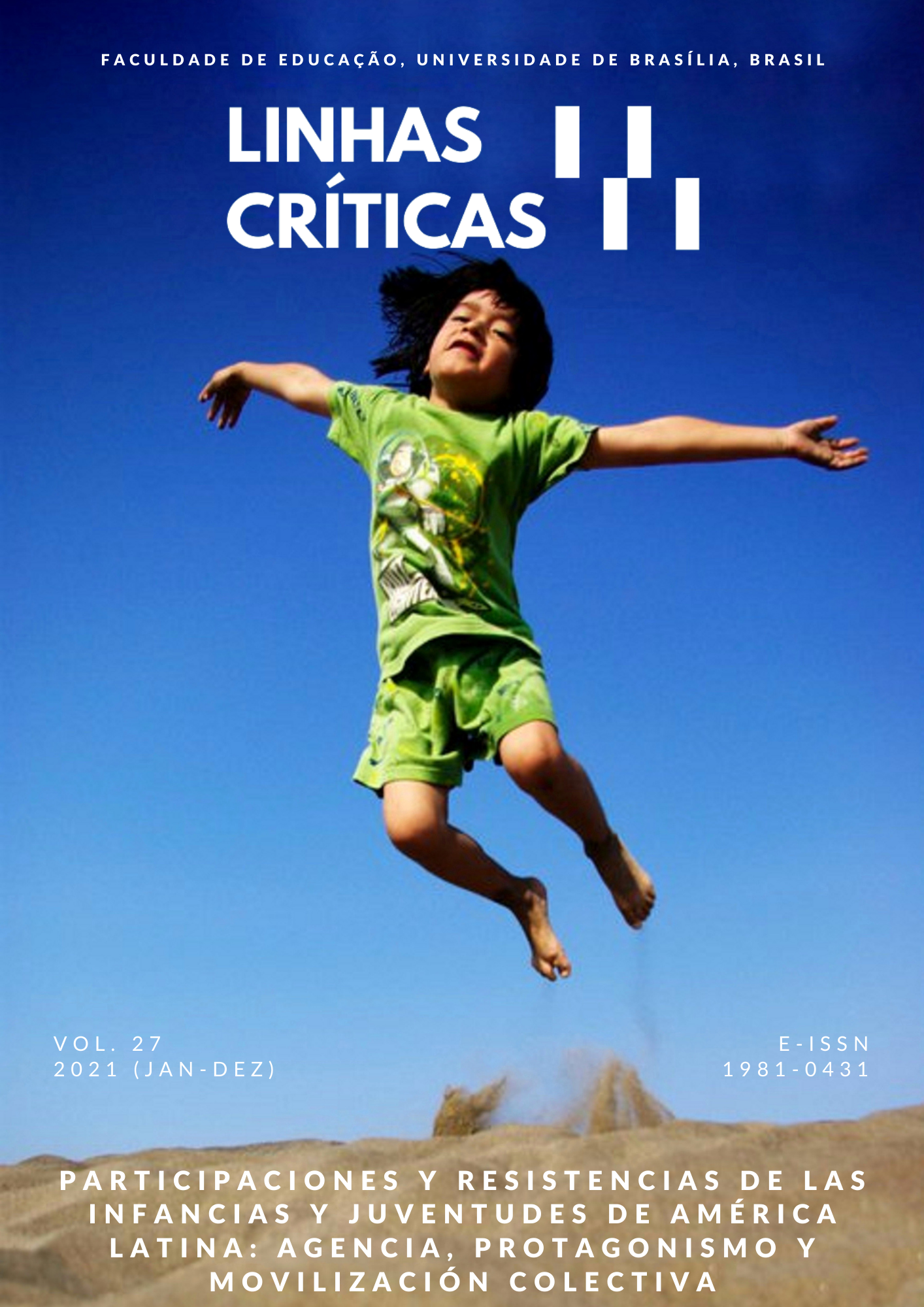Covid-19 and the work of women-mother-researchers
deadlocks in “foreign lands”
DOI:
https://doi.org/10.26512/lc27202136370Keywords:
COVID-19, Women’s work, Academic career, MaternityAbstract
This article deals with women's work articulating it with domestic, scientific and maternal work, in the pandemic context. This relationship is analyzed in feminine texts and data that exposes the situation of unemployment in Brazil. The connection care-maternity-work is discussed in papers evaluated by the Coordenação de Aperfeiçoamento de Pessoal de Nível Superior, which the term “care” should be seen as a female attribute that tends to associate women with professions related to it. In a feminist agenda, it is necessary breaking this stereotype, consolidating female scientific policies and employment rights, keeping open the place to live in to denounce the workload of women.
Downloads
References
Bittencourt, B., & Castro, M. M. (2020). Atravessamentos na pandemia: relatos maternos sobre moradia, escola e pesquisa. Revista Práxis, 12(1 (sup)). https://moodleead.unifoa.edu.br/revistas/index.php/praxis/article/view/3453/2704
Brasil. (2020). Medida Provisória nº 1.021, de 30 de dezembro de 2020 (Dispõe sobre o valor do salário mínimo a vigorar a partir de 1º de janeiro de 2021). Presidência da República. https://www.in.gov.br/en/web/dou/-/medida-provisoria-n-1.021-de-30-de-dezembro-de-2020-297208167
Bruschini, M. C. A., & Ricoldi, A. M. (2012). Revendo estereótipos: o papel dos homens no trabalho doméstico. Revista Estudos Feministas, 20(1), 259-287. https://doi.org/10.1590/S0104-026X2012000100014
Carmo, L. J. O., de Assis, L. B., Júnior, A. B. G., & Teixeira, M. B. M. (2020). O empreendedorismo como uma ideologia neoliberal. Cadernos EBAPE. BR, 1-19. http://bibliotecadigital.fgv.br/ojs/index.php/cadernosebape/article/view/82674
Cattony, L. (2019, dezembro 2). Maternidade no Lattes: uma conquista das pesquisadoras brasileiras. Lindekin. https://www.linkedin.com/pulse/maternidade-lattes-uma-conquista-das-pesquisadoras-luciana-cattony/?fbclid=IwAR10liwik0rjxZ_HsewSGuQ_gWkEkKxxDV--XmLdCnsM3AmIbSIw3UaZwOQ
Delory-Momberger, C. (2018). Réapprendre la vie: un exister dans le temps d’après. Linhas Críticas, 24, 14-25. https://doi.org/10.26512/lc.v24i0.18990
França, F. F., Priori, C., & Galinkin, A. L. (2020). Os impactos da pandemia (Covid-19) no cotidiano das pessoas: desafios e contribuições dos estudos de gênero e dos feminismos - Entrevista com Joana Maria Pedro. Revista Educação e Linguagens, 11-25. http://revista.unespar.edu.br/index.php/revistaeduclings/article/view/119
Hernandes, E. S. C., & Vieira, L. (2020, abril 17). A guerra tem rosto de mulher: trabalhadoras da saúde no enfrentamento à Covid-19. Associação Nacional dos Especialistas em Políticas Públicas e Gestão Governamental (EPPGGs). http://anesp.org.br/todas-as-noticias/2020/4/16/a-guerra-tem-rosto-de-mulher-trabalhadoras-da-sade-no-enfrentamento-covid-19
hooks, b. (2018). O feminismo é para todo mundo: políticas arrebatadoras. Rosa dos Tempos.
Instituto Brasileiro de Geografia e Estatística (IBGE). (2018). Estatísticas de gênero: indicadores sociais das mulheres no Brasil. https://biblioteca.ibge.gov.br/visualizacao/livros/liv101551_informativo.pdf
Instituto Brasileiro de Geografia e Estatística (IBGE). (2021a). Pesquisa Nacional por Amostra de Domicílios Contínua - PNAD Contínua. https://www.ibge.gov.br/estatisticas/sociais/trabalho/9173-pesquisa-nacional-por-amostra-de-domicilios-continua-trimestral.html?=&t=series-historicas&utm_source=landing&utm_medium=explica&utm_campaign=desemprego
Instituto Brasileiro de Geografia e Estatística (IBGE). (2021b). Desemprego. https://www.ibge.gov.br/explica/desemprego.php
Macêdo, S. (2020). Ser mulher trabalhadora e mãe no contexto da pandemia Covid-19: tecendo sentidos. Revista do NUFEN, 12(2), 187-204. http://doi.org/10.26823/RevistadoNUFEN.vol12.nº02rex.33
Mouffe, C. (2005). Por um modelo agonístico de democracia. Revista de Sociologia e Política, (25), 11-23. https://revistas.ufpr.br/rsp/article/view/7071
Mouffe, C. (2019). The populist moment. Simbiótica Revista Eletrônica, 6(1), 06-11. https://www.periodicos.ufes.br/simbiotica/article/view/27192/18341
Movimento Parent in Science. (2020). Produtividade acadêmica durante a pandemia: Efeitos de gênero, raça e parentalidade. https://327b604e-5cf4-492b-910b-e35e2bc67511.filesusr.com/ugd/0b341b_81cd8390d0f94bfd8fcd17ee6f29bc0e.pdf?index=true
Oliveira, A. L. (2020). A espacialidade aberta e relacional do lar: a arte de conciliar maternidade, trabalho doméstico e remoto na pandemia da COVID-19. Revista Tamoios, 16(1), 154-166. https://doi.org/10.12957/tamoios.2020.50448
Rodrigues, C. (2020, abril 20). Precisou uma pandemia para o trabalho doméstico sair da invisibilidade. #Colabora. https://projetocolabora.com.br/ods8/trabalho-domestico-enfim-deixa-de-ser-invisivel/
Silva, F. F. D., & Ribeiro, P. R. C. (2014). Trajetórias de mulheres na ciência: “ser cientista” e “ser mulher”. Ciência & Educação (Bauru), 20(2), 449-466. https://doi.org/10.1590/1516-73132014000200012
Downloads
Additional Files
Published
How to Cite
Issue
Section
License
Copyright (c) 2021 Marcela Castro

This work is licensed under a Creative Commons Attribution 4.0 International License.
Authors who publish in this journal agree to the following terms:
-Authors maintains the copyright and grants the journal the right of first publication, the work being simultaneously licensed under the Creative Commons Attribution License which allows the sharing of the work with recognition of the authorship of the work and initial publication in this journal.
- Authors are authorized to enter into additional contracts separately, for non-exclusive distribution of the version of the work published in this journal (eg publish in institutional repository or as a book chapter), with acknowledgment of authorship and initial publication in this journal.
-Authorers are allowed and encouraged to publish and distribute their work online (eg in institutional repositories or on their personal page) at any point before or during the editorial process, as this can generate productive changes as well as increase the impact and the citation of published work (See The Effect of Free Access).



